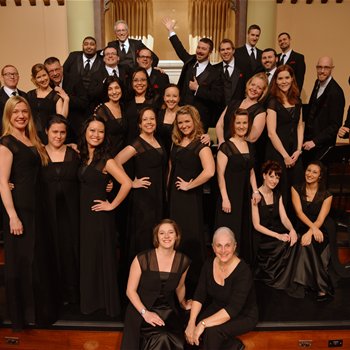Houston Chamber Choir shines in music of O’Regan, Texas composers

Composer Tarik O’Regan says his Mass Observation for choir and percussion grew from two main inspirations: a decades-long social experiment that involved eavesdropping on Britons in pubs, stores or wherever they gathered; and news reports about military drone operators who flew their warcraft by remote control, yet suffered from stress despite their apparent safety.
Those origins might suggest that O’Regan’s music would conjure up totalitarian oppression and wartime destruction, but it does not. Drawing on poetry and other texts spanning centuries, Mass Observation takes a more personal, even mystical, perspective on humanity. The Houston Chamber Choir, in a concert co-presented by the Houston new-music ensemble Musiqa, captured that spirit with subtlety, clarity and finesse Saturday at St. Philip Presbyterian Church.
In the wordless prelude and postlude, the choir’s hushed, vibrato-free tone enabled the music to build up long-sustained tone clusters that evoked a timeless vox populi. The group’s tone gradually swelled in the work’s other framing device — two movements based on an Emily Dickinson poem describing a mountain that “sat upon the plain in his eternal chair, his observation omnifold.” But here, too, conductor Robert Simpson led the group to amass sonorities whose stillness and stateliness created an almost surreptitious grandeur.
While the choral part of those sections seemed suspended in air, the percussionists (Craig Hauschildt, Luke Hubley, Zachary Luftop, Daniel Vila, Alec Warren and Blake Wilkins) added pulsation and hints of melody. The sextet brought gravity but not aggression to the tollings and stirrings that punctuated the prelude, and it gave a glistening translucency to the first percussion interlude’s chiming and hints of counterpoint.
The choir’s singing turned in new directions during the 40-minute work’s inner movements. The vocal lines took turns leading the way in a Virginia Woolf text that described families relaxing in a park, and while the words didn’t always come through, the choir’s delicacy and sweetness created an aura of a summer idyll.
That gave way to the percussion’s force and the choir’s brusque recitation in a movement based on strings of numbers — “Six! Fiver! Four! Eight!” — that made up coded messages delivered on the radio by European spy agencies. And a mellow a cappella setting of verses by D.H. Lawrence, “I listen to the stillness of you,” may have been the heart of both the work and the performance: The choir brought it warmth, suppleness and an almost conversational coziness.
The night began with works by two of Musiqa’s composer-leaders. Simpson and the choir performed the world premiere of Im Grase by Marcus Karl Maroney, who teaches composition at the University of Houston. The text, by 19th-century German poet Annette von Droste-Hülshoff, begins by savoring the grass and the outdoors, but it quickly turns into a metaphysical vision of a union between nature and the human spirit![]()
Maroney’s a cappella setting was richly harmonized, free-flowing and alert to the words’ images, and the choir savored its shadings. When the focus turned toward souls in the graves, the music’s lower parts roamed intricately, but the singers kept the lines mellow and clear; when the poem invoked bird songs “like pearls from the heights,” the sopranos vaulted, and their singing remained true and clear. The purity of the women’s voices set the tone for the final stanza’s prayer.
The choir’s assistant conductor, Brian Cook, took over for A Measure in Trance by Rice University’s Karim Al-Zand. The work’s eight a cappella vignettes spring from texts by 9th-century Arab poet Ibn Al-Mu‘tazz, and each painted a vivid picture Saturday, thanks to Cook and the choir.
In “Fateful Shackles,” the choir made an arresting shift from the trumpetings of the opening, heralding a prisoner’s morning of doom, to the smoothness and serenity that describe the victim-to-be taking refuge in memories. Cook led the group to sing with vigor in “Silver Galleon,” a celebration of wine and food after a fast, and to dash through the chattering “Incantations and Spells.” And a picture of a woman accompanying herself on the lute, “Her Inscrutable Self,” brought some adroit tone-painting: As some of the choir’s voices fanned out rapidly in chords that evoked the lute’s strumming, the rest spun out the melody.
Before the choir launched into Mass Observation, four of the percussionists played “Prayer” from Augusta Read Thomas’ Resounding Earth.
Mainly employing metal bowls, Thomas’ work made a compelling lead-in to O’Regan’s. As the four players chimed in with their individual parts, they sometimes gave them the immediacy of human speech: this declaration peaceful, that one urgent. At time, the voices’ prayers overlapped. And when the players rubbed the bowls with the heads of their drumsticks, the ethereal, sustained tones anticipated Mass Observation‘s hovering voices to come.
The Houston Chamber Choir performs “Leipzig After Bach,” May 18. houstonchamberchoir.org; 713-224-5566.